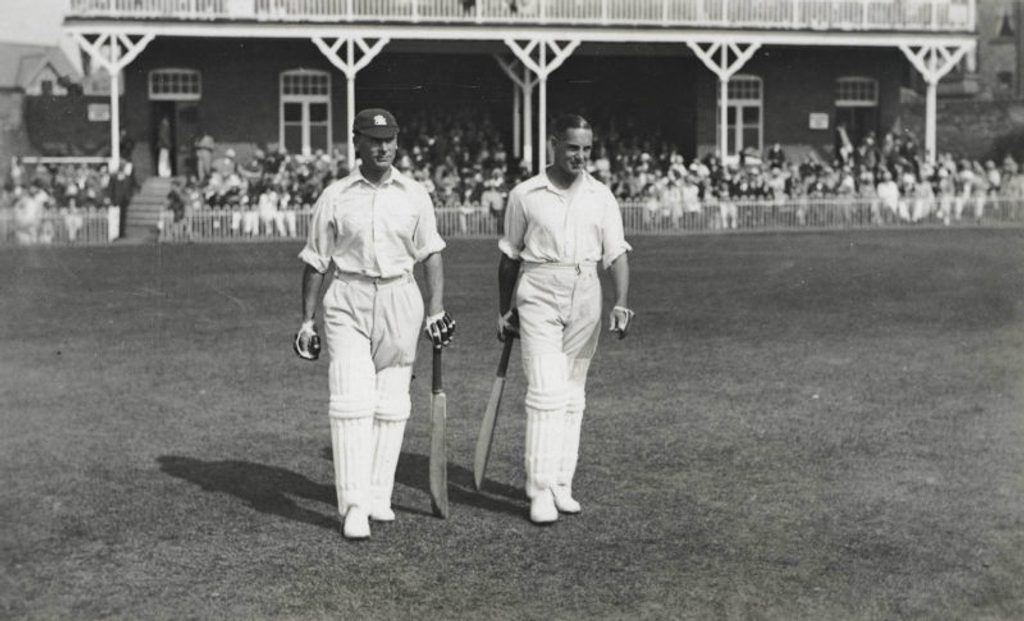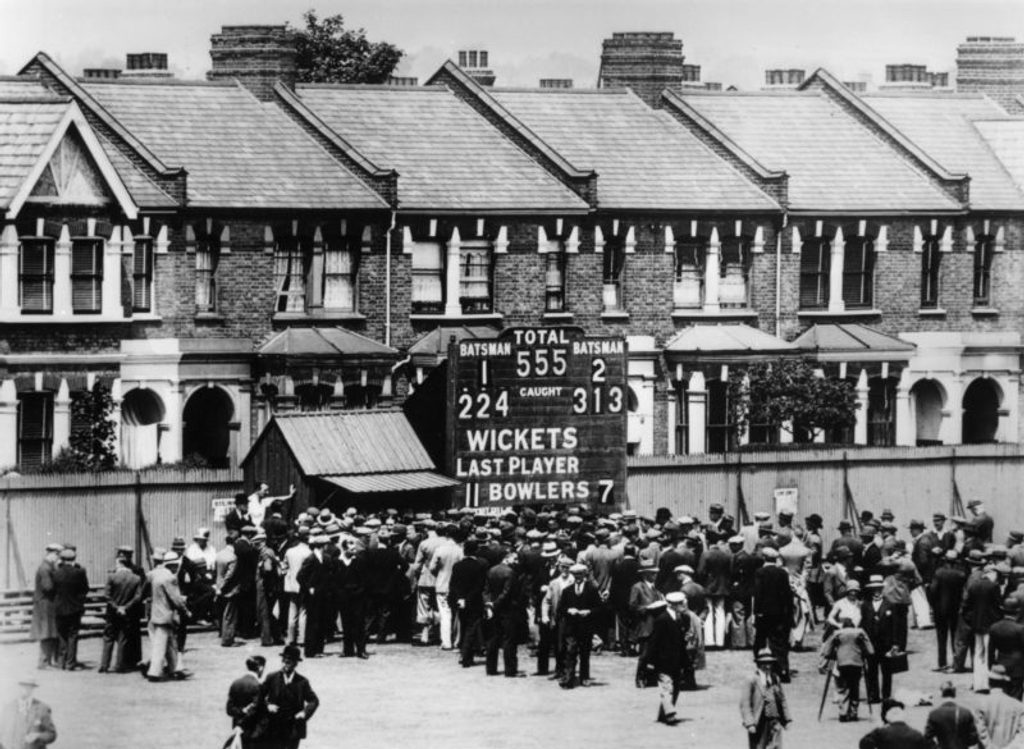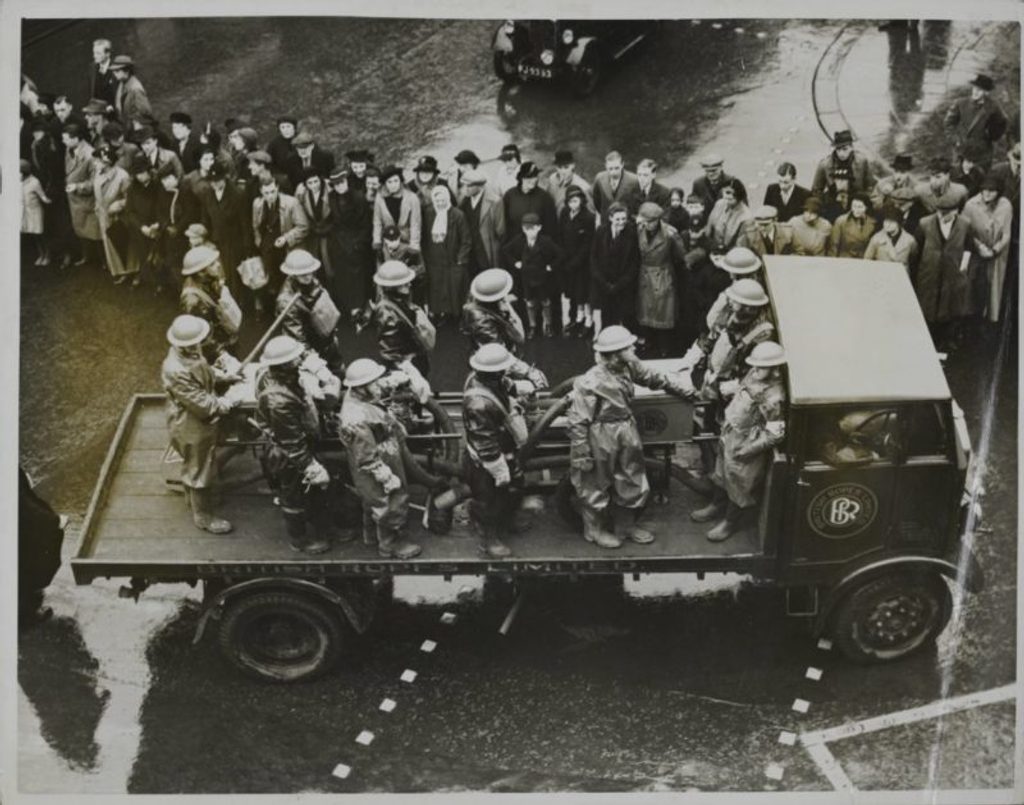
One of England’s greatest openers, Herbert Sutcliffe was a superstar of the world game between the wars. J. M. Kilburn wrote this tribute in the Wisden Cricketers’ Almanack after the batsman’s death in 1978.
Sutcliffe, Herbert died Crosshills on January 22, 1978, aged 83.
Herbert Sutcliffe was one of the great cricketers and he brought to cricket as to all his undertakings an assurance and capacity for concentration that positively commanded success. His technical talent matched his character and his achievements were therefore on the highest plane.
In a career extending from 1919 to 1939, Herbert Sutcliffe scored more than 50,000 runs and averaged 52. He never knew a season of failure, except by the standard of his own astonishing peaks, and at the zenith of his career he scored 16,255 runs in five years as a measure of mastery in all conditions and over the world’s best bowling of the time.
 Hobbs and Sutcliffe opened the batting together for England for many years
Hobbs and Sutcliffe opened the batting together for England for many years
The First World War delayed his entry into county cricket until he was 24 years old when, after demobilisation from a commission in the Green Howards, he was given a place in the Yorkshire side. His quality was never in doubt and by the end of the 1919 season he had scored five centuries in an aggregate of 1,839 runs. He had also established a first-wicket partnership with Percy Holmes. For fourteen years these two batsmen opened the innings for Yorkshire, representing a partnership of unparalleled success in which they put up the hundred on 74 occasions.
Equally happy was Sutcliffe’s Test match association with J. B. Hobbs, for this became the most accomplished of all opening partnerships. Sutcliffe’s good fortune, however, was only in the presentation of opportunity. Seizure of it was his own merit and with one partner or another he constructed 145 first-wicket century stands.
His artistry and efficiency in difficult conditions became legendary in his lifetime, with his centuries against Australia at The Oval in 1926 and at Melbourne in 1929 as historic examples. Matches against Lancashire stirred him to nine centuries. His defensive patience and skill became a byword, yet at need his hitting was brilliant in the extreme.
Against Northamptonshire at Kettering he met spin on the sticky wicket with an innings of 113 which included ten sixes. At Scarborough against the fast bowling of Farnes and Nichols, Sutcliffe took his personal score from 100 to 194 in 40 minutes. His 100th first-class century was the 132 he hit in less than two hours at Bradford when Yorkshire were hurrying to defeat Gloucestershire.
Courage and concentration were his basic attributes. No prospect daunted him, no difficulty dismayed him, no crisis upset him. He was an artist of the dead bat and an uncompromising hooker of fast bowling. He sought solution to his batting problems by taking them as they came, one at a time. He never allowed the present to be influenced by the alarms of the past or fears for the future.
In the means and manner of his performances he raised enormous prestige for himself throughout the cricketing world. He was admired and respected wherever he played and by his refusal to depreciate his own value he raised the status of his profession.
He took the supplementary rewards of his distinction with polished grace and unfailing consideration for colleagues. Herbert Sutcliffe the individual always made it clear that he was Herbert Sutcliffe inseparable from Yorkshire and England. He was as punctilious in acknowledgement of obligations as he was single-minded towards the immediate task in hand.
After the retirement of A. W. Lupton in 1927, Sutcliffe was offered the Yorkshire captaincy as a professional player. Although he was on tour in South Africa when the invitation came he appreciated the possibility of divided opinions and with characteristic diplomacy declined the appointment, giving an insurance of his willingness to play under any captain.
During his playing days he founded and developed a sports outfitting business, now directed by his elder son. After his retirement from the field he took a managerial appointment in the paper trade. He showed himself as successful in commerce as in cricket and for the same reasons of application and reliability. His repayment to the game which had given him so much was service on the Yorkshire committee, as an England selector, and as sponsor for many good causes in cricket.
Though he was born in Summerbridge, Sutcliffe was a Pudsey native in cricket association. There, as a schoolboy, he began league cricket and from there he advanced to the county, but neither Pudsey nor any other nursery could have claimed Herbert Sutcliffe as a typical product. He was a Yorkshireman in his loyalty and training, but he was cosmopolitan in approach and outlook. His manner fitted Lord’s as expressively as it fitted Leeds.
 Sutcliffe and Holmes added 555 against Essex for Yorkshire in 1932
Sutcliffe and Holmes added 555 against Essex for Yorkshire in 1932
Immaculate, alert, brisk of movement, serene in repose, he carried his character with a clear label wherever he appeared. His off-drive wore a silk hat and his hook was a ready response to the aggressive intent of any bumper. His defensive play was the reduction of risk to the minimum and his self-confidence was unshakeable.
In his first-class career he scored 149 centuries. He shared with Holmes a partnership of 555 for Yorkshire, and with Hobbs a partnership of 283 for England against Australia.
Second in the nominal batting order, Herbert Sutcliffe was second to none in steadfastness on all occasions. He was esteemed for accomplishment, he was acclaimed for his unfailing resolution. His name will always stay in the headlines.
***
Tributes from others
Sir Leonard Hutton
Herbert and Jack Hobbs were my boyhood heroes. My first innings with Herbert was a most wonderful experience for me, an uncapped Yorkshire player. A young player could not have wished to receive more encouragement than I did on that occasion. He was correct in all he did, on and off the field, but never so ambitious that he forgot he was playing a team game. Herbert was the finest hooker of the short-pitched ball that I have seen. Don Bradman was the finest puller in front of square, but Herbert hit the ball up behind square to perfection. He was at his best playing against Lancashire and Australia when every run had to be earned. I had known Herbert as long as I had known my parents and my brothers. He led me through my early days of doubts and indecision to the promised land.
Bill Bowes
Herbert was born at Summerbridge but will always be associated with Pudsey where he learned cricket and played for a local team. He had his county trial when he was 18, but the outbreak of the First World War, in which he served with the Sherwood Foresters and the Green Howards, interrupted his career. He was in his 30th year before being selected for England and he was an immediate success. He never did anything mean or underhand. His personality had the same characteristics as his batting. He was reliable. He was the first to admit that he had not the same ability as Jack Hobbs, Wally Hammond, or Sir Len Hutton, but he had concentration and the will to harness his ability. As a result he was England’s most successful batsman of all time. He was a magnificent judge of a single and a magnificent hooker of bouncers. During his long association with Percy Holmes, his county partner, they were involved in only 22 run outs – slightly more than one a season.
 Sutcliffe assisting in national service recruitment
Sutcliffe assisting in national service recruitment
Sir Donald Bradman
I was very sorry to hear of his death. He was a great player and he had the best temperament of any cricketer I ever played with or against.
Harold Larwood
Herbert Sutcliffe needed some getting out. He was a great battler for England and for Yorkshire. He never gave his wicket away – unless he was satisfied he had made enough already. With Percy Holmes he formed just about the finest opening partnership I bowled against. I got him out cheaply a few times, but he scored a few hundreds against my bowling, so I reckon we ended up just about square.
Brian Sellers
We played together for eight years from when I was elected captain in 1932 and it was not an easy job to fill. I had never played first-class cricket and I was to skipper a side of real professionals who knew their job from A to Z. It was then I really got to know Herbert and he was of great help to me. Later we served together on the county committee for over 21 years. Very few people realise what a great fellow he was. He was always courteous, kind and considerate, and he helped many people in many ways. He was also an astute businessman, brimful of confidence and concentration. You never saw him untidy; always chest out and chin up. Apart from being one of the all-time greats in our wonderful game, he was a great gentleman and was known as such throughout the cricket world.
R. C. Robertson-Glasgow
He was the serenest batsman I have known. Whatever may have passed under that calm brow – anger, joy, disagreement, surprise, relief, triumph – no outward sign was betrayed on the field of play. When I first saw him, in 1919, he was a debonair and powerful stylist. As you bowled opening overs to the later Sutcliffe you noticed the entire development of every defensive art; the depressingly straight bat, the astute use of pads (as with Hobbs), the sharp detection of which out-swinger could be left; above all, the consistently safe playing down of a rising or turning ball on leg stump, or thighs.








